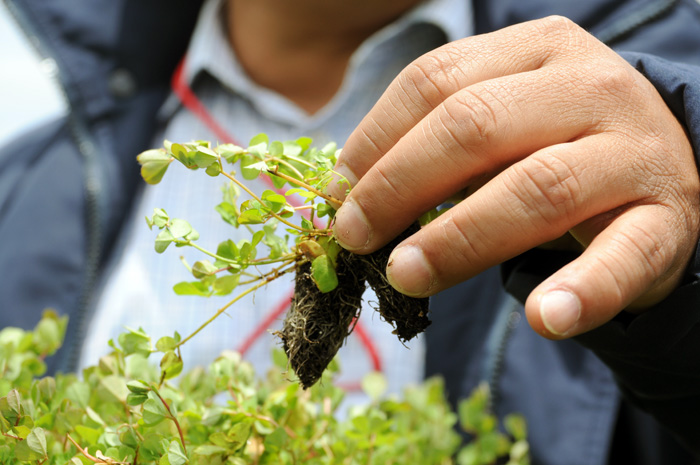This small plant, which is a delicacy for cattle, in short time will turn to be a good crop that will allow preventing the gas emissions of invernadero effect, produced by the Bolivian Industry in Sabana de Bogotá. In addition, it will allow livestock farmers having cows which procure 18% more milk each.
This idea was established by Édgar Cárdenas, a researcher from the Faculty of Veterinarian Medicine and Animal Husbandry, which for 13 years, along with undergraduate and postgraduate students, has proved in field experiments the benefits of this multifaceted plant.
Lotus has many advantages from different angles; however, it has one "defect": its slow growth. After several research studies, many properties have been detected and verified. It is a vegetable that when eaten by cattle, diminishes radically nitrogen elimination in urine and post generation of N2O (nitrous oxide); furthermore, it reduces the emission of CH4 (methane), one of the biggest invernadero effect gases.
Cárdenas affirms that this happens since the diet protein in cows, instead of degrading (as it happens with other diets), is absorbed by the animal"s intestine. At the same time, methanogenesis is reduced, which consists of methane formation due to intestinal microbes intervention.
Lotus also contains tannins, secondary metabolites (chemical compounds synthesized by plants) responsible for a better production and quality of milk. In the experiments financed by the Ministry of Agriculture and Rural Development, associations and livestock farming co-operatives, it was proved that due to the consumption of this crop, in combination with kikuyu grass and without nitrogen fertilization, milk production increases in 18%, compared to the production using traditional grass.
"Kikuyu is a type of grass that needs nitrogen fertilization, 400 kilos a year per hectare. In contrast, Lotus takes it from the environment and incorporates it into its tissues," said the researcher. This information is important if it is taken into account that 35% of the urea (nitrogen fertilizer) used in the plant is captured by it. The rest goes directly to contaminate the environment, especially water sources.
It was also proved that milk from cattle fed with Lotus increases its protein content in 14% and fat in 11%. Besides, the plant resists the frost days, holds soil humidity, bears stress of cows" steps and it spreads properly once it settles in the soil.
One month ago, when Lotus was introduced to society, close to 600 livestock farmers from Sabana de Bogotá were amazed, although the plan was not unknown for some. Édgar Cárdenas explains that pulses are from New Zealand and were introduced by livestock farmers in the country 30 years ago; however, it was not conceived as a nutritious option.
"Lotus seed in the soil takes between 8 and 9 months to spread, and for transplantable vegetal material, it takes between 4 and 5 months, depending on the fertility and humidity of the soil. Meanwhile, livestock farmers want grass such as ryegrasso, which are ready in less than 70 days.
How to convince the sector" With something as simple as being competitive. The researcher form Universidad Nacional de Colombia affirms that international markets are demanding productivity without ecological impact, otherwise they close the doors. Switzerland, Sweden, and New Zeeland are leaders in this topic and they demand this characteristic to their providers. Thus, Universidad Nacional de Colombia contributes to improve the sustainability and competitiveness, responding to the environment and new markets.
View the whole article about this topic in the current issue of UN Periódico
(www.unperiodico.unal.edu.co)
Sedes
 Correo Electrónico
Correo Electrónico
 DNINFOA - SIA
DNINFOA - SIA
 Bibliotecas
Bibliotecas
 Convocatorias
Convocatorias
 Identidad UNAL
Identidad UNAL



